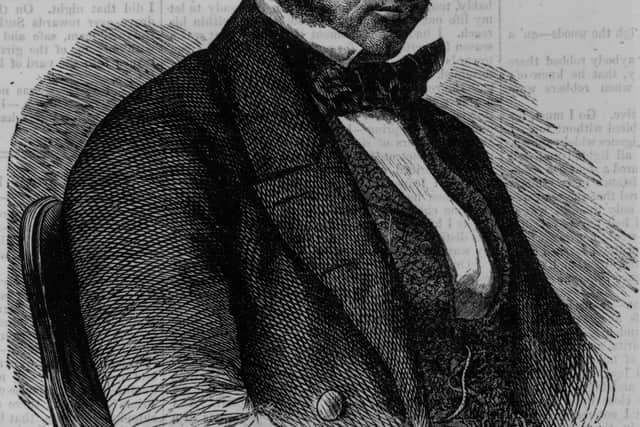The forgotten Scots shipping merchant who rubbed shoulders with Abraham Lincoln
He was the orphaned boy who yearned to become a cabin boy after running away to sea, and went on to build one of the world’s mightiest merchant shipping empires.
Now, a new book aims to restore the reputation of William Schaw Lindsay, the Scot who rubbed shoulders with the likes of Abraham Lincoln and Benjamin Disraeli, only to become neglected as a footnote in the history of Victorian Britain.
Advertisement
Hide AdAdvertisement
Hide AdThroughout a long and storied career, Lindsay played the roles of sailor, ship broker, shipowner, MP, and author, earning a reputation as one of the world’s foremost maritime experts in the exciting new era of ocean-going steamships, and a leading advocate of free trade. What made Lindsay’s success all the more remarkable is that he came from nothing. He was the youngest of five children, born into a struggling family in Ayr in December 1815. At the time, his mother was homeless, and his father was a struggling merchant who had turned to alcohol. Lindsay was still an infant when they moved to slums in the Gorbals area of Glasgow, where their woes continued. At the age of just 10, Lindsay’s mother died, and he was sent back to Ayr to live with his uncle and aunt. By the time he was 16, however Lindsay had had his fill of suffering, and decided to head out to sea, boarding a steamer bound for Liverpool.
At the time, he was disconsolate, writing of how he felt “alone in the world” and a “child of poverty.” But that fateful journey, where a young Lindsay toiled in the coal bunkers and helped the stokers in the boiler room in lieu of a fare, would mark the first chapter in the rest of his life.
The new book, based on Lindsay’s own diaries, has been written by his great-great grandson, Bill, who first learned about his ancestor’s remarkable life while reading an article about shipping. That sparked further research at the National Maritime Museum in Greenwich, which holds an extensive collection of Lindsay’s journals, diaries, and correspondence, as well as contemporary newspaper accounts documenting his exploits.
As his descendant pored through the archives, he quickly pieced together Lindsay’s life, and began using the diary entries to create a narrative. The result is ‘William Schaw Lindsay: Victorian Entrepreneur’, a book told in Lindsay’s own words. It spans a boy’s own adventure in Lindsay’s formative years, documenting a near-death experience during a torrid storm in the Atlantic, attacks by pirates, and an outbreak of yellow fever that left half his crew dead. But the story comes into its own as it recalls Lindsay’s success as a ship broker.
Having amassed a few hundreds pounds in savings after nearly a decade at sea, he began establishing docks and wharves in Hartlepool, before partnering with his brother-in-law, Robert Stewart, who ran an iron and coal business in the North Lanarkshire village of Cleland, selling iron. One success followed another, and in 1845, he founded W.S Lindsay & Co. By the next decade, it blossomed into one of the largest shipping firms in the world. Lindsay owned 22 ships, some of which were employed as troop transporters in the Crimean War.


Such business success brought other rewards. Lindsay won the seat of Tynemouth and entered parliament in 1854, where he focused on shipping matters. He was vocal in his criticism of the admiralty’s management during the Crimean War, and in the lead up to the American Civil War, visited the Northern states to discuss shipping laws.
That episode is a highlight in the new book. It recalls an 1860 dinner Lindsay attended at the Illinois home of the then president-elect, Abraham Lincoln, where the fare on offer was typically American. “We spent a very pleasant evening with Mr Lincoln, despite his wife, who seemed determined not to part with her ham,” Lindsay’s diary entry notes.
It is one of numerous flashpoints Lindsay had with seminal figures of the day. The book details his encounters with a who’s who of the 19th century, from Queen Victoria and Benjamin Disraeli, to Isambard Kingdom Brunel and David Livingstone. Such insights, says Lindsay’s great-great grandson, demonstrate the importance of bringing his diaries to a new audience.
Advertisement
Hide AdAdvertisement
Hide Ad“Lindsay’s journals provide fascinating first-hand insights into merchant shipping in Victorian days, mismanagement of the Crimean War, and European involvement in the American Civil War,” he explained. “But it is more than that. It is a story of how a man, who came from nothing, created one of the largest maritime businesses in Victorian times.”
Dr David Davies, chairman of the Society for Nautical Research, said the new tome about Lindsay rightly restores to the public’s attention a man he described as “eminent Victorian”. Dr Davies, who contributed a foreword to the new book, explained: “Lindsay’s is a genuine rags-to-riches story. He was orphaned as a child and then seeking a living as the proverbial cabin boy, he made a hugely successful career for himself in shipping and commerce by dint of sheer hard work and determination.
“At one time he owned one of the largest merchant shipping companies in the world, and his own vessels assisted in the transportation of the British and French armies during the Crimean War. He knew many of the greatest men of the age, from Gladstone and Disraeli to Brunel, Abraham Lincoln, and the Emperor Napoleon III.”
Although illness forced Lindsay to retreat from public life by 1865, he devoted the twilight of his life to writing a history of merchant shipping, which became a trusted reference source. According to the Oxford Dictionary of National Biography, the Scot was worth around £45,000 at the time of his death – around £4.3 million today.
William Schaw Lindsay: Victorian Entrepreneur by Bill Lindsay is available from Amberley Publishing.
Comments
Want to join the conversation? Please or to comment on this article.